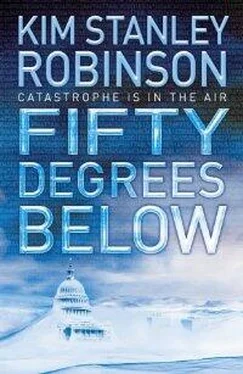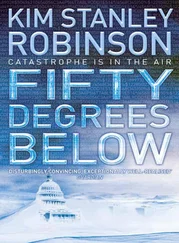Kim Stanley Robinson
Fifty Degrees Below
Nobody likes Washington, D. C. Even the people who love it don’t like it. Climate atrocious, traffic worse: an ordinary midsized gridlocked American city, in which the plump white federal buildings make no real difference. Or rather they bring all the politicians and tourists, the lobbyists and diplomats and refugees and all the others who come from somewhere else, often for suspect reasons, and thereafter spend their time clogging the streets and hogging the show, talking endlessly about their nonexistent city on a hill while ignoring the actual city they are in. The bad taste of all that hypocrisy can’t be washed away even by the food and drink of a million very fine restaurants. No — bastion of the world government, locked vault of the World Bank, fortress headquarters of the world police; Rome, in the age of bread and circuses — no one can like that.
So naturally when the great flood washed over the city, wreaking havoc and leaving the capital spluttering in the livid heat of a wet and bedraggled May, the stated reactions were varied, but the underlying subtext often went something like this: HA HA HA. For there were many people around the world who felt that justice had somehow been served. Capital of the world, thoroughly trashed: who wouldn’t love it?
Of course the usual things were said by the usual parties. Disaster area, emergency relief, danger of epidemic, immediate restoration, pride of the nation, etc. Indeed, as capital of the world, the president was firm in his insistence that it was everyone’s patriotic duty to support rebuilding, demonstrating a brave and stalwart response to what he called “this act of climactic terrorism.” “From now on,” the president continued, “we are at a state of war with nature. We will work until we have made this city even more like it was than before.”
But truth to tell, ever since the Reagan era the conservative (or dominant) wing of the Republican party had been coming to Washington explicitly to destroy the federal government. They had talked about “starving the beast,” but flooding would be fine if it came to that; they were flexible, it was results that counted. And how could the federal government continue to burden ordinary Americans when its center of operations was devastated? Why, it would have to struggle just to get back to normal! Obviously the flood was a punishment for daring to tax income and pretending to be a secular nation. One couldn’t help thinking of Sodom and Gomorrah, the prophecies specified in the Book of Revelation, and so on.
Meanwhile, those on the opposite end of the political spectrum likewise did not shed very many tears over the disaster. As a blow to the heart of the galactic imperium it was a hard thing to regret. It might impede the ruling caste for a while, might make them acknowledge, perhaps, that their economic system had changed the climate, and that this was only the first of many catastrophic consequences. If Washington was denied now that it was begging for help, that was only what it had always done to its environmental victims in the past. Nature bats last — poetic justice — level playing field — reap what you sow — rich arrogant bastards — and so on.
Thus the flood brought pleasure to both sides of the aisle. And in the days that followed Congress made it clear in their votes, if not in their words, that they were not going to appropriate anything like the amount of money it would take to clean up the mess. They said it had to be done; they ordered it done; but they did not fund it.
The city therefore had to pin its hopes on either the beggared District of Columbia, which already knew all there was to know about unfunded mandates from Congress, to the extent that for years their license plates had proclaimed “Taxation Without Representation”; or on the federal agencies specifically charged with disaster relief, like FEMA and the Army Corps of Engineers and others that could be expected to help in the ordinary course of their missions (and budgets).
Experts from these agencies tried to explain that the flood did not have a moral meaning, that it was merely a practical problem in city management, which had to be solved as a simple matter of public health, safety, and convenience. The Potomac had ballooned into a temporary lake of about a thousand square miles; it had lasted no more than a week, but in that time inflicted great damage to the infrastructure. Much of the public part of the city was trashed. Rock Creek had torn out its banks, and the Mall was covered by mud; the Tidal Basin was now part of the river again, with the Jefferson Memorial standing in the shallows of the current. Many streets were blocked with debris; worse, in transport terms, many Metro tunnels had flooded, and would take months to repair. Alexandria was wrecked. Most of the region’s bridges were knocked out or suspect. The power grid was uncertain, the sewage system likewise; epidemic disease was a distinct possibility.
Given all this, certain repairs simply had to be made, and many were the calls for full restoration. But whether these calls were greeted with genuine agreement, Tartuffian assent, stony indifference, or gloating opposition, the result was the same: not enough money was appropriated to complete the job.
Only the essentials were dealt with. Necessary infrastructure, sure, almost; and of course the nationally famous buildings were cleaned up, the Mall replanted with grass and new cherry trees; the Vietnam Memorial excavated, the Lincoln and Jefferson Memorials recaptured from their island state. Congress debated a proposal to leave the highwater mark of greenish mud on the sides of the Washington Monument, as a flood-height record and a reminder of what could happen. But few wanted such a reminder, and in the end they rejected the idea. The stone of the great plinth was steam-cleaned, and around it the Mall began to look as if the flood had never happened. Elsewhere in the city, however…
It was not a good time to have to look for a place to live.
And yet this was just what Frank Vanderwal had to do. He had leased his apartment for a year, covering the time he had planned to work for the National Science Foundation; then he had agreed to stay on. Now, only a month after the flood, his apartment had to be turned over to its owner, a State Department foreign-service person he had never met, returning from a stint in Brazil. So he had to find someplace else.
No doubt the decision to stay had been a really bad idea.
This thought had weighed on him as he searched for a new apartment, and as a result he had not persevered as diligently as he ought to have. Very little was available in any case, and everything on offer was prohibitively expensive. Thousands of people had been drawn to D.C. by a flood that had also destroyed thousands of residences, and damaged thousands more beyond immediate repair and reoccupation. It was a real seller’s market, and rents shot up accordingly.
Many of the places Frank had looked at were also physically repulsive in the extreme, including some that had been flooded and not entirely cleaned up: the bottom of the barrel, still coated with sludge. The low point in this regard came in one semibasement hole in Alexandria, a tiny dark place barred for safety at the door and the single high window, so that it looked like a prison for troglodytes; and two thousand a month. After that Frank’s will to hunt was gone.
Now the day of reckoning had come. He had cleared out and cleaned up, the owner was due home that night, and Frank had nowhere to go.
Читать дальше
Конец ознакомительного отрывка
Купить книгу












